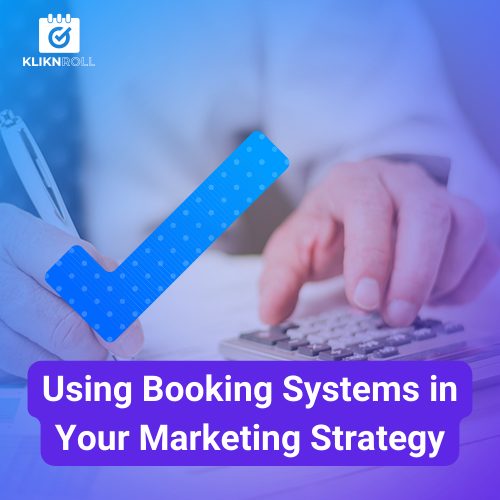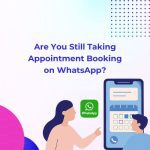Table of Contents
How an Online Booking System Can Help in Your Marketing Strategy
An online booking system might not directly boost your marketing, but it sure helps with the conversion rate. Conversion rate is the ratio of the number of people who make a booking compared to the number of people who click on your ads.
It’s all about trust—people tend to trust businesses that offer a legit booking system, and scammers are less likely to have these systems in place. Plus, it’s also convenient.
Having a booking system allows customers to book effortlessly in advance. This means that you can run ads even during working hours to be able to get more bookings and get a lower cost per result since you will not be competing with businesses that don’t have a booking system and are relying solely on calls.
It also can help you target customers who are at the top and middle of the marketing funnel, customers who are interested but are not looking to make a reservation immediately.
A booking system offers a convenient way for them to save your link, allowing them to make a booking later on their own terms, rather than convert now over the phone. This flexibility is a significant advantage in managing your marketing funnel.
7+ Ways to Use Booking Systems in Your Marketing Strategy
Set Your Online Booking Link as a CTA for Your Campaigns
As we’ve talked about earlier, a booking system is great for optimizing conversion rates for your marketing campaigns.
To do this, you should ideally place your online booking links for your marketing campaigns, to test and collect data.
Based on our own experience with clients, an online booking link will almost always outperform phone calls on most marketing campaigns, at least in the restaurant industry.
To pinpoint which click is coming from which campaign or platform, you can use UTM codes for comprehensive tracking.
Make sure to A/B test your CTA, because the conversion rate might vary for different industries and locations!
Use a QR Code on Your Marketing Materials
Using your online booking QR code is another way to combine offline marketing efforts with online channels, a practice commonly known as Omnichannel Marketing in the industry.
Essentially, it’s about bridging the gap between your offline campaigns—such as flyers, banners, or events—and your online presence.
For example, including a QR code on your offline materials allows potential customers to easily get more information on your booking system.
If you’re a restaurant, this approach becomes even more impactful if you have an integrated online delivery system, which allows customers to order delivery right after looking at your flyer.
The same thing applies to vouchers: by allowing customers to claim vouchers through orders or bookings, you ensure they’re promptly claimed rather than forgotten in a drawer.
This strategy ensures that your marketing efforts are cohesive across various channels, maximizing engagement and conversions – offline or online!
If you’re unfamiliar, here’s how you can make a QR code for your booking system:
- Go to a QR code generator of your choosing, we like to use The QR Code Generator.
- Type in the URL of your booking system, you can also add your UTM parameters if required.
- Download the image and start using it on your marketing materials!
Use Your Booking System Data to Gauge Customer Behavior
An online booking system can help you get to know your customers better. This will help you optimize and personalize your marketing campaigns.
For example, if you find that younger customers like Gen Z are making a lot of late-night bookings through your booking platform, this could be generational behavior.
This tells you that trying out late-night online advertising might be a good idea to increase the conversion rate among younger users – maybe at a fraction of the cost.
Moreover, you can also use online cookies to help with retargeting, particularly for users who dropped out of the booking process.
Link Your Booking Software to a Loyalty Program
Integrating your online booking system with a loyalty program can provide valuable insights into customer behavior.
This integration allows you to track individual customer activity and identify patterns, such as decreased engagement. With this information, you can develop strategies to retarget dormant customers.
A well-designed loyalty program rewards customers for their continued business. By incorporating a sign-up and login feature into your booking software, customers can easily join the loyalty program and start earning rewards.
In the beginning, you should be offering an incentive, like a voucher or a gift, that can effectively attract new members to the program.
This strategy effectively builds customer loyalty and simultaneously boosts the impact of your marketing efforts.
Plus, it’s efficient—you can encourage customers to book and/or join your loyalty program at the same time, making each click more valuable from social media or Google Ads.
Run Promos Through Your Booking System
In line with the previous point, your online booking system can also help in your marketing efforts through strategic upselling, thereby raising the average revenue per lead.
For instance, you can offer a promotion that rewards customers with a bigger discount when they book several gym coaching sessions at once, rather than a single session.
This not only boosts the lifetime value of your customers but also strengthens their commitment to your business, enhancing customer retention.
Over time, this method can positively affect customer loyalty, particularly when combined with a loyalty program.
You can also try out various strategies to suit different businesses and sectors. Maybe like offering an early-bird discount for new products or service launches or a tiered discount system in restaurants that provides greater savings for customers reserving bigger tables.
Using Booking Systems to Support Events & Roadshows
If your business wants to dabble in events and roadshows, a booking system can also be used as an innovative ticketing solution. These systems are packed with features that make everything run smoother, from planning to wrapping up.
Booking systems can easily be integrated into your event software, keeping you updated on who’s coming, what they like, and what they think—all in real-time.
This means you can make your events as personalized as possible. Plus, things like automatic reminders and easy mobile check-ins can be a great way to reduce no-shows and unnecessary friction.
You can also consolidate data like these, so you can keep the conversation going even after the event’s over, see how well your event did, and get a good gauge of your return on investment (ROI).
Feedback Collection & No-Show Reduction
An online booking system can also be used as a feedback collection tool as well as to increase ROI through no-show reduction.
The customer experience doesn’t just stop at the booking process—real profit comes when the service is rendered and payment is made.
If a customer doesn’t show up to the appointment, all marketing efforts are wasted. That’s where a robust booking system steps in, offering integrated reminders through emails, texts, or chatbots to ensure customers remember their appointments.
Additionally, an online booking system can also serve as a secure platform for collecting deposits, providing an extra layer of commitment from the customer.
After the appointment, the system can also double as a feedback mechanism, automatically sending out emails to gather customer opinions, which are great for business improvement and can be added to your CRM.
You can also have your online system prompt a link to your Google profile, which they can give a review immediately. Good reviews help you rank better on search engines like Google.
Can Online Booking Systems Help in Operations As Well?
Yes, an online booking system can help in operations too, and does not only benefit the marketing aspect of a business.
It streamlines business operations by automating tasks like scheduling, internal communication, inventory management, resource allocation, etc. They can be integrated with CRM and inventory systems, ensuring data is up-to-date and consistent.
For example, a restaurant using a booking system can estimate how much inventory it needs based on the number of customers that booked a spot at the buffet.
Not to mention, features like automated reminders and staff scheduling can also help reduce administrative work and improve efficiency.
Reporting tools that collect data from your online booking system are important for better decision-making and process optimization.
These systems support marketing efforts by improving operational workflows, leading to cost savings and business agility.

Hey there! I’m Jeffrey Hau, and my journey in the digital world started after I wrapped up my psychology degree at UCLA. Imagine coming back to the bustling streets of Hong Kong from the tech haven of Silicon Valley – it was a whirlwind of inspiration! Seeing how social media platforms were evolving at breakneck speed and realizing the limitations of traditional advertising in this digital age, I decided to dive in.
In 2012, I laid the foundation of Prizm Group. From our humble beginnings, we’ve now blossomed into a global powerhouse with a team of over 200 passionate professionals. Our HQ is right here in Hong Kong, and we’ve spread our wings to SG, AU, NZ, JP, and China.
As a digital problem solver, our team found that several industries are in need of reservation systems, especially for F&B, Hotels, Beauty, and Medical sectors. Our digital magicians started crafting reservation systems tailored to cater to these specific needs. We extended our expertise to e-commerce, voucher management systems, and campaign management systems, combining them into KlikNRoll – an all-in-one solution. We deep dive into various industries, understanding their unique challenges and developing innovative solutions.
We’re not just a company; we’re your dedicated partners in transforming how you navigate the digital landscape. Our passion lies in providing businesses with intuitive and tailored solutions using KlikNRoll’s powerful capabilities.
Ready to embark on this exciting digital adventure with us? Let’s make your brand stand out in the digital jungle!






